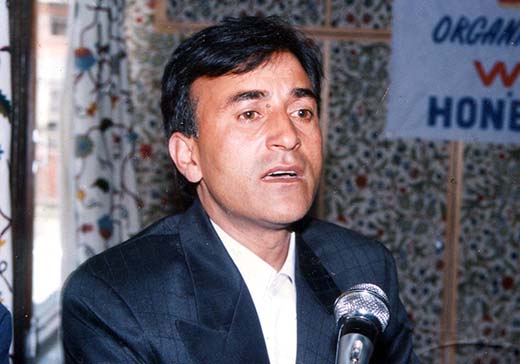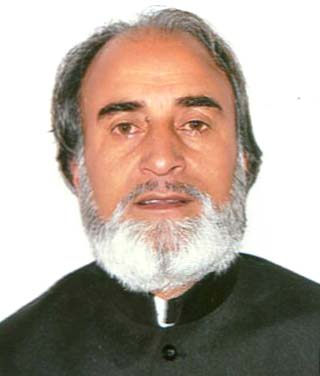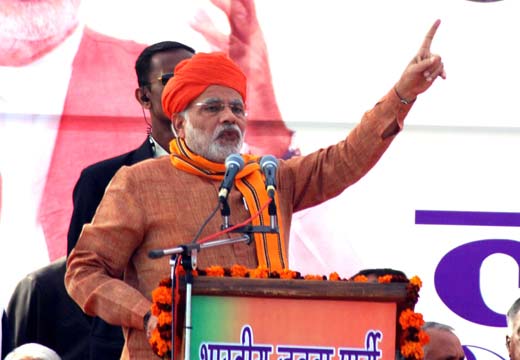Last week when Modi was sworn in as India’s PM, a small village in Budgam district jogged their memories to remember the man who stayed amongst them. Safwat Zargar meets Mohammad Ashraf Azad who hosted Modi at his residence

In the 1990s, when Kashmir erupted in a violent armed struggle against Indian rule, there were many who after a brief tryst with armed struggle, distanced from the ‘idea of gun’ and as a result took different political tracks to ‘lessen the problems of Kashmiris.’ One such man was Mohammad Ashraf Azad of Budgam, who – much against the majority sentiment – joined Bharatiya Janata Party (BJP) in the 90s to ‘address the problems of Kashmir.’
It was in 1993 when Azad – remembered as a ‘renegade’ by his native villagers – who had migrated to Jammu to avoid ‘pressure from different armed groups’, befriended a member of Rashtriya Swayamsevak Sangh (RSS), Narendra Damodardas Modi in Jammu. A few months later, Azad hosted Modi at his house in Hakarmulla village of Budgam for many days. “He had black hair at that time. Narendra Modi stayed at my house and ate with us,” Azad says. “Even my neighbours at Hakarmulla know him.”
“He didn’t eat meat, fish or chicken. During his stay at my house, he took only Daal and Roti. We made cheese for him at home,” he says. Azad calls himself one of the ‘few friends from Kashmir’ of India’s newly sworn-in 15th Prime Minister. During that time, Modi travelled to almost every district in Kashmir. “Modi travelled to Kupwara, Bandipora, Ganderbal, Baramulla, Budgam, Srinagar, Shopian,” he says.

“Unfortunately, my house in Hakarmulla where Modi had stayed in 1993 was burnt down by some unknown men in 1998 after I fought 1996 elections,” Azad says.
Born in 1968 to a modest family in a small village of Budgam, a barber by profession, Mohammad Ashraf Hajam alias Mohammad Ashraf Azad shifted to Hakarmulla village after his mother’s death. The journey from a simple and ordinary Mohammad Ashraf Hajam to Ashraf Azad has been ‘a struggle and learning process for him,’ with Azad claiming that ‘BJP has taught him like a teacher teaches a child.’
With the rise of BJP to the power at the centre in 1998, Modi was appointed party in charge for J&K. In 1999, during the Kargil War, Azad led a rally of BJP workers from Srinagar to Kargil on the request of Modi. “He told me: Azad, everyone is going to Kargil by air, but I want you to go by road. We went there and met locals and the army.”
When National Conference led state government passed a resolution on autonomy in state legislative assembly in 2000, Azad, along with his supporters, took to the streets on the orders of Modi to protest against the move. “We protested outside the assembly complex in Srinagar. I was kept in prison for two days,” Azad says.
Azad, a lean man, with thin hair and a white beard, sitting in one of the rooms of his poorly furnished government accommodation in Srinagar seems delighted with the ‘phenomenal rise’ of Modi, whom he likes to call ‘Narendra Bhai Modi.’ “I congratulated him after his win in the elections. He remembers me. He even enquired about the well being of my family.”
“I told him that we need five things here: democracy, humanity, Kashmiriyat, due rights to every individual and help for the underprivileged,” Azad says. “He (Modi) promised me that he’ll do all these things to solve the miseries of Kashmir.”
“Even some of the elders of my village question me that isn’t Modi the same person who used to stay at your house,” Azad says, chuckling.
According to Azad, Modi has been a victim of ‘media’s negative campaigning.’ Azad says that he has seen “Modi closely, spent time with him and has never seen a humane individual than Modi.”
“Narendra Bhai is a simple man with a good heart. During the militancy in the early 90s he was repeatedly asking me why the blood of youth was being spilt on the soil of Kashmir,” he says. “Modi was worried about heaven turning into hell for Kashmiris.”
Mohammad Ashraf Azad believes that Modi’s Kashmir policy will be focused on the development of J&K as a ‘super-state.’ In 2000, during an event at Srinagar, Modi said that Kashmiris need work and jobs so that the state doesn’t remain backward. Azad says that Modi’s Kashmir policy will be manifested in the coming two and a half months.
A father of four – two sons and two daughters – Azad has unsuccessfully fought three elections from Budgam assembly constituency as an independent candidate once and twice on BJP’s ticket. In 1996, during an election rally in Budgam, he escaped a militant attack. Next year, his house was attacked in Budgam leaving one of his party workers dead.
Azad had an accident in 2006 due to which he remained in a coma for a long time. Narrating one of his close incidents with Modi, Azad, who was invited for a national executive body meeting of BJP at Nagpur in 2009, says that while being the Chief Minister of Gujarat, Narendra Modi rose from the munch and came to him. “Narendra Bhai enquired about my health and questioned me that why didn’t I answer his calls,” says Azad, with a mixture of Kashmiri and typical Hindi words. “I was amazed that such a huge leader is showing concern for me.”

Pic: Asif Naik
“In addition, L K Advani who was also on the much said Modiji, Meri Taraf Se Bhi Haal Chaal Poochnaa (Mr Modi, please ask about his well being on my behalf also),” says Azad. “Even Sushma Swaraj walked down from munch to greet me.”
According to Azad, the most important thing he likes about the Hindu Nationalist party BJP is that BJP never changes its stand or attitude about its enemy.
He believes that it was the Indira-Abdullah accord that actually led to the eruption of violence in the valley. “Sheikh Abdullah himself is responsible to create the conditions for turning this beautiful valley into a graveyard,” he says.
“Bharatiya Janata Party has given me such identity and status that I don’t need to tell anyone from Governor to IG Kashmir who am I,” Azad says. According to Azad, he has met Dr Manmohan Singh four times, President of India Pranab Mukherjee once, and hardly is there any top BJP or RSS leader who doesn’t know him. “If I have to visit a government office or a politician, I only forward a slip with my name and BJP written on it.”
During the recent pre-election rally at Jammu, Modi called Azad on a platform and kept his hand on Azad’s shoulder. “He shook hands with everybody and kept my hand held with his left hand. He didn’t let me go until he finished shaking hands. He then told me that Aap Se Milna Hai (Have to meet you),” says Azad. “People have chosen him and people are not less than a God.”















